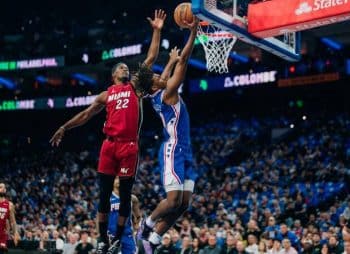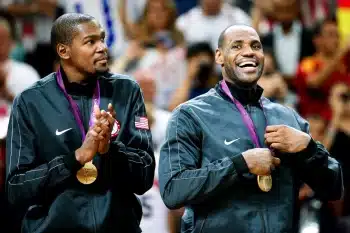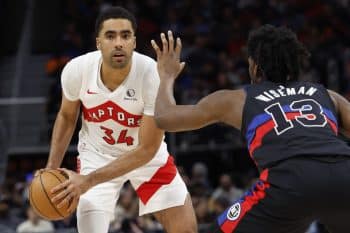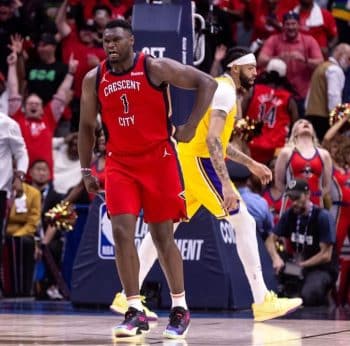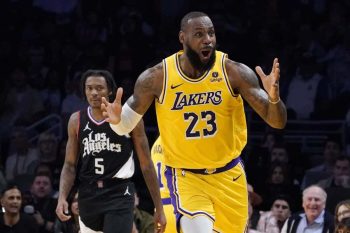NBA
NBA AM: Controlling The NBA Draft Process

Controlling The Process
The 2016 NBA Draft Lottery will take place tonight in New York, and the exact order for June’s NBA draft will be decided.
From there, the game of who will get access to top overall prospects Ben Simmons and Brandon Ingram will begin.
| Team | Chances | 1st | 2nd | 3rd |
| Philadelphia | 250 | 0.250 | 0.215 | 0.178 |
| LA Lakers | 199 | 0.199 | 0.188 | 0.171 |
| Brooklyn* | 156 | 0.156 | 0.157 | 0.156 |
| Phoenix | 119 | 0.119 | 0.126 | 0.133 |
| Minnesota | 88 | 0.088 | 0.097 | 0.107 |
| New Orleans | 63 | 0.063 | 0.071 | 0.081 |
| New York* | 43 | 0.043 | 0.049 | 0.058 |
| Sacramento | 19 | 0.019 | 0.022 | 0.027 |
| Denver | 19 | 0.019 | 0.022 | 0.027 |
| Milwaukee | 18 | 0.018 | 0.021 | 0.025 |
| Orlando | 8 | 0.008 | 0.009 | 0.012 |
| Utah | 7 | 0.007 | 0.008 | 0.010 |
| Washington | 6 | 0.006 | 0.007 | 0.009 |
| Chicago | 5 | 0.005 | 0.006 | 0.007 |
*have traded the rights to this pick.
A recurring theme from this year’s NBA Draft Combine was that the agents for the top-tier players are being hyper aggressive and there are many who are not hiding the fact they intend to control the process for their guys even if it means a player ends up going a few spots lower than maybe the player would like – if only to ensure the player’s lands in an ideal situation.
Some of this has been playing out for some time, specifically with the top two or three players, but this year it’s becoming clear that the agents involved are not only going to turn away workouts, but may deny teams access to medical information or even face to face meetings.
In Simmons case, he did not attend the combine, nor did he agree to any of the NBA medical testing. On the surface, this does not seem like a big deal, but agent-released medical tests is a problem for some NBA teams even if the talent level of the player in question is incredibly high.
Historically, the thoroughness of the NBA’s independent medical review has uncovered significant medical issue that have cratered some players’ draft stock and it seems that many of the top-tier guys simply are not going to allow that to happen this year.
One prominent executive likely drafting in the top five this year joked that there must be something to hide, given how aggressive some of the agents have become regarding their clients. This same executive acknowledged it probably wouldn’t stop his team from drafting any of the players who opted out of the medical, which is sort of the problem. As much as teams bemoan the power agents having over the draft process, it does not seem anyone is ready to call them on it and not draft the player.
The by-product of that is that the agents continue to find a new line, and force teams to cross it and many don’t or won’t.
The truth is a team can draft any player they choose when it’s their turn to pick, but with so much riding on the success of a draft pick, can a team really afford to draft a player without a full background and medical evaluation?
The agents are counting on a team to say ‘no’ and allow them steer their client to either a favorable market, a favorable playing situation or simply the spot where their client has the chance to become the biggest star.
Why does any of this matter?
If the nature of the NBA Draft and the draft lottery is to help the losing teams get better talent, how is that helpful if a team like Philadelphia or Sacramento gets some lottery luck only to be told they can’t get access to Simmons or Ingram, even if they hold the top pick?
It is unlikely that either player turns away the number one overall pick, but when it comes to pick two or three would it be better to be a Laker, King, Sixer or Sun?
Agents have influenced the draft process for years, so this is not exactly a new thing, but what is becoming clear is that some agents are more emboldened in what they will agree to do with regards to their clients than ever before. That could make this draft an interesting one to watch, because so many players seem to be willing to pass on a few draft spots in order to pick where they ultimately play and that may not be a good thing for the teams holding high draft picks.
The Myth Of The $100 Million Shoe Deal
As someone joked on social media this year, the easiest click bait on the internet is that “Top Prospect ___ is Signing a $100 Million Shoe Deal.”
While some top picks like LeBron James have landed mega deals, those are extremely rare.
Yes, shoe companies want the players, and the battle between Nike and adidas is only going to heat up once adidas is out from under the NBA apparel deal, which sucks up a lot of capital that adidas is going to reallocate to other endeavors like signing players.
But the truth is, signing rookies to shoe deals is a bit of a crap shoot and, for the most part, their initial deals reflect that. Top overall pick Andrew Wiggins’ deal with adidas pays him about $2 million per year with incentives and bonuses tied to things like making the All-Star team, winning annual awards and so on. His teammate Karl-Anthony Towns got something similar from Nike.
Current top prospect Ben Simmons has been trying to jockey himself into a deal in advance of tonight’s NBA Draft Lottery, but it seems that neither Nike nor adidas were overly interested in moving off the same deal structure as Wiggins and Towns. That could change after the ping-pong balls are settled, but it seems more likely than not that Simmons will end up with a $10-$12 million, five-year package, which is fairly normal for a top-tier draft pick and not bad money to wear cool new shoes.
The real money for players is when they are far more established. Believe it or not, the shoe companies want to sell shoes. All of the hype to sign guys is to achieve two goals – make the brand look cool to kids and move product.
Once it’s clear that a player resonates with the target market, that’s when the money flows in. Steph Curry’s new Under Armour deal was the result of crazy interest in Curry. Kevin Durant’s mega-deal with Nike was a result of interest in the KD product line. Damian Lillard is moving product for adidas and his deal is reflective of that.
While a lot of people talk about the total value of a shoe deal, it’s fairly rare that a player is simply paid cash for an endorsement. A lot of a player’s shoe money comes from exposure bonuses like All-Star, national TV games, playoff runs, awards and, of course, product sales. While Lillard does not get a piece of every Lillard shoe sold, he does get a bonus if the shoe does well in the marketplace.
There is little doubt that the shoe game is a good business to be in, but to think that shoe companies are going to go all the way in on an unproven rookie is a little far-fetched unless that rookie is already a game changer among the target demographic. As much as Ben Simmons and Brandon Ingram get basketball fans excited, the 14-to-18-year-olds don’t part with mom’s money on a whim and the shoe companies monitor that closely.
Simmons and Ingram both likely end up with lucrative deals, but the idea of the $100 million deal isn’t much more than click bait, so don’t fall for it.
More Twitter: Make sure you are following all of our guys on Twitter to ensure you are getting the very latest from our team: @stevekylerNBA, @AlexKennedyNBA, @LangGreene, @EricPincus, @joelbrigham, @SusanBible @TommyBeer, @MokeHamilton , @jblancartenba and @CodyTaylorNBA .
